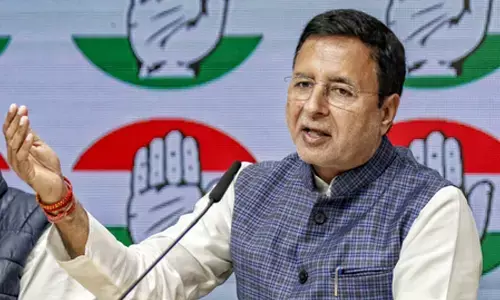RBI likely to keep policy rates unchanged

RBI Likely To Keep Policy Rates Unchanged. The Reserve Bank of India (RBI) is likely to maintain status quo on key rates when it reviews its monetary policy Tuesday as inflation remain sticky.
New Delhi: The Reserve Bank of India (RBI) is likely to maintain status quo on key rates when it reviews its monetary policy Tuesday as inflation remain sticky.
Exerts and market analysts say the central bank would like to see more clarity on inflation trend before tinkering with the policy rates.
“We are expecting no change in the policy rates. Despite recent decline there is an upside risk to inflation,” Arun Singh, a senior economist at Dun & Bradstreet, told IANS.
He said considering the current macro-economic situation the RBI has little room to lower the policy interest rates.
“Inflation has fallen but risk is still there. Moreover, inflation remain much above the RBI's comfort level, so there is hardly any scope of rate cut,” said Singh adding there was more possibility of further tightening in the rates.
The RBI is scheduled to announce third quarter review of the monetary policy Tuesday. This will be the fourth policy review since Governor Raghuram Rajan took charge in September.
RBI left all rates unchanged in December after hiking key policy interest rate (repo rate) twice between September and November.
In the December policy review, Rajan had clarified that the future policy decisions would be guided by the trend in inflation, especially food and core inflation.
While prices of food articles have cooled and there is a substantial decline in inflation - both wholesale and retail markets - according Singh the decline is not enough to take a call on easing the monetary policy.
Wholesale price-based inflation declined to a five-month low of 6.16 percent in December. It was at a 14-month high of 7.52 percent in November.
There was a similar decline in retail inflation. The Consumer Price Index (CPI) based inflation eased to 9.87 percent in December from 11.16 percent in the previous month, according to the latest official data.
“With cooling off of high vegetable prices and their further normalisation along with the impact of rate hikes already taken, we expect the RBI to hold monetary policy rates during its Jan 28 policy review,” said Bhupali Gursale, an economist at Angel Broking.
Former president of industry body FICCI and country head of HSBC India Naina Lal Kidwai also expressed a similar view saying the RBI is unlikely to make any change in its key policy rates.
Currently, the repo rate, the rate banks pay when they borrow money from the central bank to meet their short-term fund requirements, stands at 7.75 percent per annum.
Reverse repo rate, the interest rate that the RBI pays to commercial banks when they keep their surplus short-term funds with the central bank, is at 6.75 percent, while marginal standing facility rate is 8.75 percent.
These rates determine lending and borrowing rates by the commercial bank, thus affect equated monthly installments (EMIs) on home, auto and other loans.
India Inc and a section of the government have been clamouring for rate cuts to revive economic growth, which is lingering at a decade low.
India's gross domestic product (GDP) growth slumped to 4.6 percent in the first half of the current financial year, the worst performance in over a decade. Factory output, measured in terms of the Index of Industrial Production (IIP) dropped by 2.1 percent in November.
Finance Minister P Chidambaram said the RBI must act to support the economic growth as inflation control was only one among its objectives.
“Inflation targeting is only one among the objectives...another objective of the RBI must be to support growth,” Chidambaram said at the World Economic Forum annual meeting in Davos recently.
Persistent inflation and sluggish growth add to the dilemma of the central bank. RBI Governor Rajan last week termed inflation a “destructive disease” saying it would hurt economic growth in the long run.
IANS
Next Story











